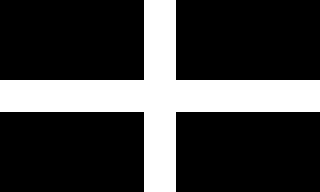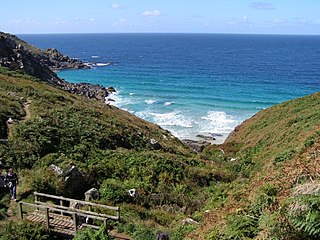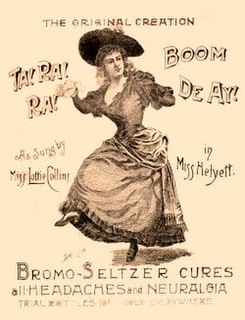Related Research Articles

Cornwall is a historic county and ceremonial county in South West England. It is recognised as one of the Celtic nations, and is the homeland of the Cornish people. Cornwall is bordered to the north and west by the Atlantic Ocean, to the south by the English Channel, and to the east by the county of Devon, with the River Tamar forming the border between them. Cornwall forms the westernmost part of the South West Peninsula of the island of Great Britain. The southwesternmost point is Land's End and the southernmost Lizard Point. Cornwall has a population of 568,210 and an area of 3,563 km2 (1,376 sq mi). The county has been administered since 2009 by the unitary authority, Cornwall Council. The ceremonial county of Cornwall also includes the Isles of Scilly, which are administered separately. The administrative centre of Cornwall is Truro, its only city.

A pixie is a mythical creature of British folklore. Pixies are considered to be particularly concentrated in the high moorland areas around Devon and Cornwall, and in the New Forest area of Dorset and Hampshire.

The most famous Furry Dance takes place in Helston, Cornwall, United Kingdom. It is one of the oldest British customs still practised today. The earliest mention seems to be in a letter to the Gentleman's Magazine for 1790 where the writer says "At Helstone, a genteel and populus borough town in Cornwall, it is customary to dedicate the 8th May to revelry. It is called Furry Day". The dance is very well attended every year and people travel from all over the world to see it: Helston Town Band play all the music for the dances.
Cornwall is a Celtic nation with a long musical history. Strengthened by a series of 20th century revivals, traditional folk music has a popular following. It is accompanied by traditions of pipers, brass and silver bands, male voice choirs, classical, electronic and popular music.
"Ombra mai fu", also known as "Largo from Xerxes", is the opening aria from the 1738 opera Serse by George Frideric Handel.

The culture of Cornwall forms part of the culture of the United Kingdom, but has distinct customs, traditions and peculiarities. Cornwall has many strong local traditions. After many years of decline, Cornish culture has undergone a strong revival, and many groups exist to promote Cornwall's culture and language today.

"The Song of the Western Men", also known as "Trelawny", is a Cornish patriotic song, composed by Louisa T. Clare for lyrics by Robert Stephen Hawker. The poem was first published anonymously in The Royal Devonport Telegraph and Plymouth Chronicle in September 1826, over 100 years after the events.

Brenda Wootton was a Cornish folk singer and poet and was seen as an ambassador for Cornish tradition and culture in all the Celtic nations and as far as Australia and Canada.
Hail to the Homeland is one of the unofficial anthems of Cornwall, in the south west of the UK. It was composed by the Cornish musician Kenneth Pelmear who composed and arranged many works for church and male voice choirs and brass bands. The words were written by Pearce Gilbert in 1959.
Cornish dance originates from Cornwall, UK. It has largely been shaped by the Cornish people and the industries they worked in. In most cases, particularly with the step dancing, the dances were still being performed across the region when they were collected.
Lamorna is a traditional folk song/ballad associated with Cornwall, and dealing with the courtship of a man and a woman, who turned out to be his wife. The title comes from Lamorna, a village in west Cornwall. Sheet music held in the British Library dates the song to 1910.

Pendour Cove is a beach in west Cornwall, England, UK. It is about 1 mile northwest of the village of Zennor, and immediately to the west of Zennor Head.

"Ta-ra-ra Boom-de-ay" is a vaudeville and music hall song. Its first known public performance was in Henry J. Sayers' 1891 revue Tuxedo in Boston, Massachusetts. The song became widely known in the version sung by Lottie Collins in London music halls in 1892. The melody was later used in various contexts, including as the theme song to the television show Howdy Doody.
Delkiow Sivy is a Cornish folk song.

"There's a Long, Long Trail" is a popular song of World War I. The lyrics were by Stoddard King (1889–1933) and the music by Alonzo "Zo" Elliott, both seniors at Yale. It was published in London in 1914, but a December, 1913 copyright for the music is claimed by Zo Elliott.
Cornish surnames are surnames used by Cornish people and often derived from the Cornish language such as Jago, Trelawney or Enys. Others have strong roots in the region and many in the UK with names such as Eddy, Stark or Rowe are likely to have Cornish origins. Such surnames for the common people emerged in the Middle Ages, although the nobility probably had surnames much earlier on. Not until the later Middle Ages did it become necessary for a common man to have a surname. Most surnames were fully established throughout Cornwall by the end of the 15th century. Today Cornish surnames can be found throughout the world as part of the Cornish diaspora.
"Peggy Gordon" is a Canadian folk song that has become popular in many English-speaking countries. As a folk song it was first collected in the 1950s and 1960s in Canada, mainly in Nova Scotia.

The Mermaid of Zennor is a popular Cornish folk tale that was first recorded by the Cornish folklorist William Bottrell in 1873. The legend has inspired works of poetry, literature and art.
"One Morning in May" is an English folk song which has been collected from traditional singers in England and the USA and has also been recorded by revival singers. Through the use of double-entendre, at least in the English versions, it tells of an encounter between a grenadier and a lady.
Presented below is an alphabetical index of articles related to Cornwall:
References
- ↑ "Sweet Nightingale". mainlynorfolk.info. Retrieved 1 February 2015.
- 1 2 Bell, Robert, ed. (1857). Ancient Poems Ballads and Songs of the Peasantry of England. John W. Parker and Son, West Strand. pp. 247–251.
- ↑ Gundry, Inglis, ed. (1966). Canow Kernow: Songs and Dances from Cornwall. Federation of Old Cornwall Societies.